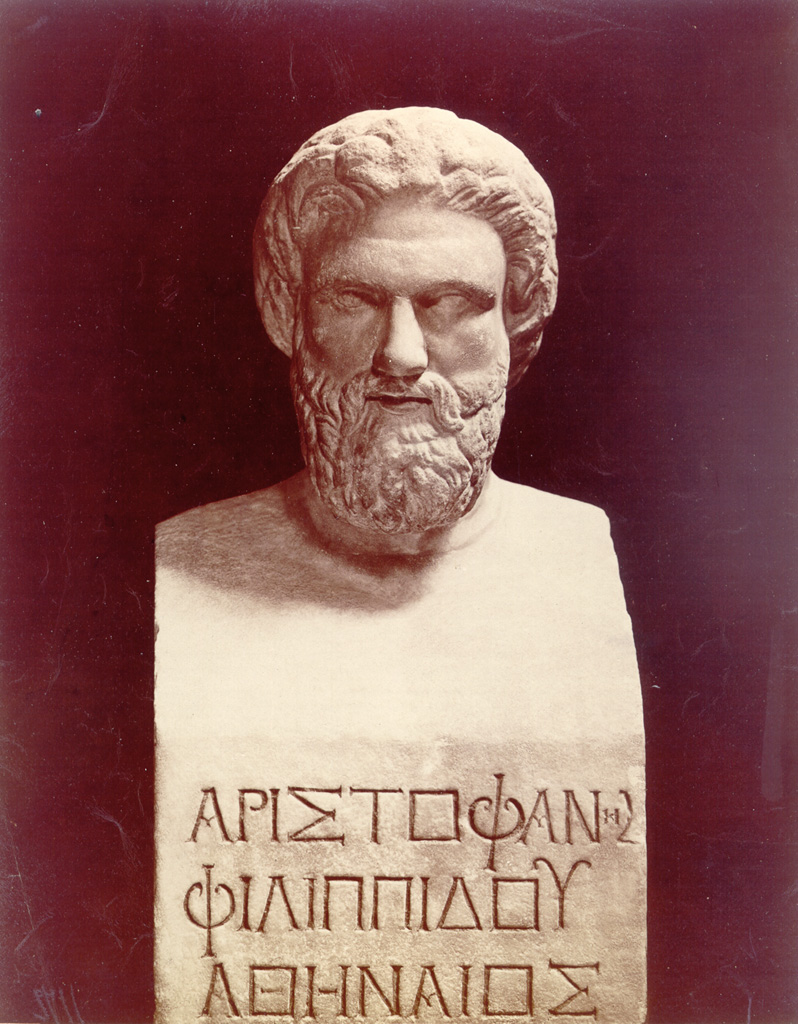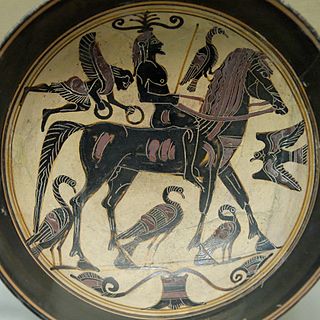 W
WAssemblywomen is a comedy written by the Greek playwright Aristophanes in 391 BC. The play invents a scenario where the women of Athens assume control of the government and instate reforms that ban private wealth and enforce sexual equality for the old and unattractive. In addition to Aristophanes' political and social satire, Assemblywomen derives its comedy through sexual and scatological humor. It is important to note that the play aimed to criticize the Athenian government at the time.
 W
WThe Birds is a comedy by the Ancient Greek playwright Aristophanes. It was performed in 414 BC at the City Dionysia where it won second place. It has been acclaimed by modern critics as a perfectly realized fantasy remarkable for its mimicry of birds and for the gaiety of its songs. Unlike the author's other early plays, it includes no direct mention of the Peloponnesian War and there are few references to Athenian politics, and yet it was staged not long after the commencement of the Sicilian Expedition, an ambitious military campaign that greatly increased Athenian commitment to the war effort. In spite of that, the play has many indirect references to Athenian political and social life. It is the longest of Aristophanes' surviving plays and yet it is a fairly conventional example of Old Comedy.
 W
WThe Clouds is a Greek comedy play written by the playwright Aristophanes. A lampooning of intellectual fashions in classical Athens, it was originally produced at the City Dionysia in 423 BC and was not as well received as the author had hoped, coming last of the three plays competing at the festival that year. It was revised between 420 and 417 BC and was thereafter circulated in manuscript form.
 W
WThe Knights was the fourth play written by Aristophanes, who is considered the master of an ancient form of drama known as Old Comedy. The play is a satire on the social and political life of classical Athens during the Peloponnesian War and in this respect it is typical of all the dramatist's early plays. It is unique however in the relatively small number of its characters and this was due to its vitriolic preoccupation with one man, the pro-war populist Cleon. Cleon had prosecuted Aristophanes for slandering the polis with an earlier play, The Babylonians, for which the young dramatist had promised revenge in The Acharnians, and it was in The Knights that his revenge was exacted. The Knights won first prize at the Lenaia festival when it was produced in 424 BC.
 W
WLysistrata is an ancient Greek comedy by Aristophanes, originally performed in classical Athens in 411 BC. It is a comic account of a woman's extraordinary mission to end the Peloponnesian War between Greek city states by denying all the men of the land any sex, which was the only thing they truly and deeply desired. Lysistrata persuades the women of the warring cities to withhold sexual privileges from their husbands and lovers as a means of forcing the men to negotiate peace—a strategy, however, that inflames the battle between the sexes.
 W
WPeace is an Athenian Old Comedy written and produced by the Greek playwright Aristophanes. It won second prize at the City Dionysia where it was staged just a few days before the Peace of Nicias was validated, which promised to end the ten-year-old Peloponnesian War. The play is notable for its joyous anticipation of peace and for its celebration of a return to an idyllic life in the countryside. However, it also sounds a note of caution, there is bitterness in the memory of lost opportunities and the ending is not happy for everyone. As in all of Aristophanes' plays, the jokes are numerous, the action is wildly absurd and the satire is savage. Cleon, the pro-war populist leader of Athens, is once again a target for the author's wit, even though he had died in battle just a few months earlier.
 W
WThesmophoriazusae, or Women at the Thesmophoria, is one of eleven surviving plays by Aristophanes. It was first produced in 411 BC, probably at the City Dionysia. The play's focuses include the subversive role of women in a male-dominated society; the vanity of contemporary poets, such as the tragic playwrights Euripides and Agathon; and the shameless, enterprising vulgarity of an ordinary Athenian, as represented in this play by the protagonist, Mnesilochus. The work is also notable for Aristophanes' free adaptation of key structural elements of Old Comedy and for the absence of the anti-populist and anti-war comments that pepper his earlier work. It was produced in the same year as Lysistrata, another play with sexual themes.
 W
WThe Wasps is the fourth in chronological order of the eleven surviving plays by Aristophanes, the master of an ancient genre of drama called 'Old Comedy'. It was produced at the Lenaia festival in 422 BC, a time when Athens was enjoying a brief respite from the Peloponnesian War following a one-year truce with Sparta.